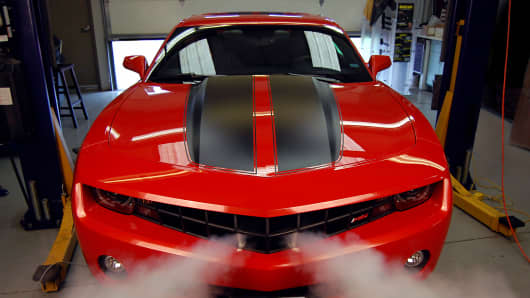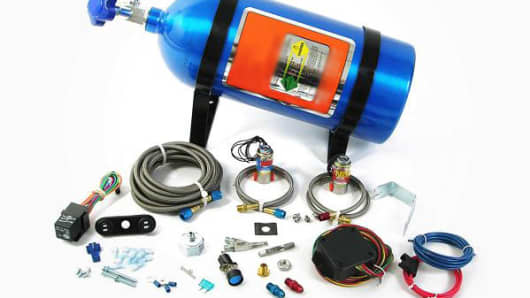Nitrous oxide: The car killer?
#1
Member

Thread Starter
Join Date: Dec 2001
Location: Savannah, GA
Posts: 95
Likes: 0
Received 0 Likes
on
0 Posts
Vehicle: 2001 Elantra
Looking around at different nitrous kits I saw this article that was done back in October of last year.
http://www.cnbc.com/id/101130763
An innate desire in some that puts fear in others, the need for speed when it comes to automobiles is not new; and when it comes to finding ways to achieve it, the use of nitrous oxide is not without controversy.
A colorless, odorless gas used in World War II as an oxidizer to enhance engine output in aircraft, nitrous oxide soon became a go-to method to increase speed in vehicles. When used in an automobile, it's stored as liquid in a tank and upon injection it mixes with gasoline, allowing the engine to burn fuel more quickly, thus increasing speed.
Many gear heads and drag racers love it. But according to Jeff Allen, the owner of Flat 12 Gallery, and his right-hand man and technician, Perry Brandt, using nitrous oxide is the fastest way to ruin your car.
"It's like a person taking speed. What happens? You start seeing their teeth are decaying and falling out. And they start aging," Allen said. "They could be 20 years old and you think they look like they're 80. That's exactly what [nitrous oxide] does to the inside of your engine."
Brandt goes on to explain that nitrous oxide is very hard on an engine's main bearings and rods.

"It's real cheap horsepower," said Brandt. "But you put it in that motor and you are gonna beat that motor to death."
But not all speed enthusiasts agree. Douglas R. Glad, the editor of Car Craft Magazine, says point blank that there is no inherent damage created by using nitrous oxide in a vehicle.
"It makes no difference you just have to know what you're doing," he said.
"This myth was created by people who damage the engine because they don't know what they're doing," Glad said.
Glad maintains that if two vehicles that are the exact same make and model were driven for 100,000 miles back-to-back in the same fashion, one correctly using nitrous oxide and the other not using the compound, both engines would end up in the same condition.
"I think if used the way it's designed, it's a great tool to increase the efficiency of your engine," Glad said. "I love the stuff and have plenty of cars that I've use it in for years, and nothing bad has ever happened."

Nitrous oxide in racing vehicles
Allen and Brandt agree that if a vehicle is built with the intention of using nitrous oxide in its engine, it will not necessarily be damaged.
"There's guys out there that absolutely believe in [nitrous oxide]. They know how to use it. For them it works," Brandt said.
But for the average guy who goes out to buy a new car, Brandt said, the last thing he should do is go down to a speed shop and buy a nitrous tank and plug it into his car.
"Because you're just going to void the warranty. You're going to ruin the car. Now, if the car was made for [nitrous oxide use] from scratch, that's a different story," Brandt said.
Allen added that the Average Joe looking to increase his vehicle's speed by using nitrous oxide should consider another factor.
"When people [are] running NOS in racing," Allen said, "They would come back into the pit, take that motor completely apart and rebuild it before the next run."
Either way, whether a vehicle is built for nitrous oxide usage or not, both Allen and Brandt do not believe in using the gas as a speed enhancer. Instead, they say they'd rather increase an engine's speed the old fashioned way—by adding cubic inches to it. Or when it comes to newer fuel injected engines, Allen recommends using a supercharger or turbo for added horsepower as a safe alternative.
http://www.cnbc.com/id/101130763
An innate desire in some that puts fear in others, the need for speed when it comes to automobiles is not new; and when it comes to finding ways to achieve it, the use of nitrous oxide is not without controversy.
A colorless, odorless gas used in World War II as an oxidizer to enhance engine output in aircraft, nitrous oxide soon became a go-to method to increase speed in vehicles. When used in an automobile, it's stored as liquid in a tank and upon injection it mixes with gasoline, allowing the engine to burn fuel more quickly, thus increasing speed.
Many gear heads and drag racers love it. But according to Jeff Allen, the owner of Flat 12 Gallery, and his right-hand man and technician, Perry Brandt, using nitrous oxide is the fastest way to ruin your car.
"It's like a person taking speed. What happens? You start seeing their teeth are decaying and falling out. And they start aging," Allen said. "They could be 20 years old and you think they look like they're 80. That's exactly what [nitrous oxide] does to the inside of your engine."
Brandt goes on to explain that nitrous oxide is very hard on an engine's main bearings and rods.

"It's real cheap horsepower," said Brandt. "But you put it in that motor and you are gonna beat that motor to death."
But not all speed enthusiasts agree. Douglas R. Glad, the editor of Car Craft Magazine, says point blank that there is no inherent damage created by using nitrous oxide in a vehicle.
"It makes no difference you just have to know what you're doing," he said.
"This myth was created by people who damage the engine because they don't know what they're doing," Glad said.
Glad maintains that if two vehicles that are the exact same make and model were driven for 100,000 miles back-to-back in the same fashion, one correctly using nitrous oxide and the other not using the compound, both engines would end up in the same condition.
"I think if used the way it's designed, it's a great tool to increase the efficiency of your engine," Glad said. "I love the stuff and have plenty of cars that I've use it in for years, and nothing bad has ever happened."

Nitrous oxide in racing vehicles
Allen and Brandt agree that if a vehicle is built with the intention of using nitrous oxide in its engine, it will not necessarily be damaged.
"There's guys out there that absolutely believe in [nitrous oxide]. They know how to use it. For them it works," Brandt said.
But for the average guy who goes out to buy a new car, Brandt said, the last thing he should do is go down to a speed shop and buy a nitrous tank and plug it into his car.
"Because you're just going to void the warranty. You're going to ruin the car. Now, if the car was made for [nitrous oxide use] from scratch, that's a different story," Brandt said.
Allen added that the Average Joe looking to increase his vehicle's speed by using nitrous oxide should consider another factor.
"When people [are] running NOS in racing," Allen said, "They would come back into the pit, take that motor completely apart and rebuild it before the next run."
Either way, whether a vehicle is built for nitrous oxide usage or not, both Allen and Brandt do not believe in using the gas as a speed enhancer. Instead, they say they'd rather increase an engine's speed the old fashioned way—by adding cubic inches to it. Or when it comes to newer fuel injected engines, Allen recommends using a supercharger or turbo for added horsepower as a safe alternative.
#3
Super Moderator


That person is a fool. You may safely disregard other articles which include their opinions. In theory, increasing power increases wear. If the engine can safely handle 330HP for a decade (like our Beta) and you add a 30 shot to the stock 140HP, you will not have an appreciable increase in engine wear or shortened service life.
If you have to use a hundred-thousand dollar non-destructive inspection tool set to show differences in engine wear after a hundred thousand miles, there is no difference worthy of mention.
That said, I can't remember the last time I looked to CNBC for car advice so
If you have to use a hundred-thousand dollar non-destructive inspection tool set to show differences in engine wear after a hundred thousand miles, there is no difference worthy of mention.
That said, I can't remember the last time I looked to CNBC for car advice so



